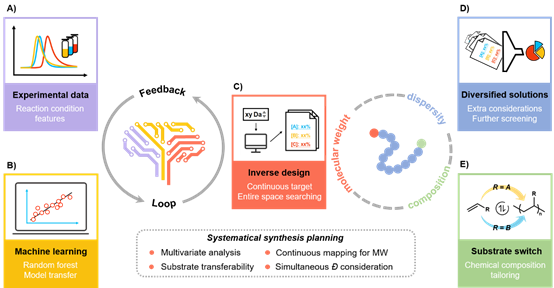 +565 975 658
+565 975 658
 info@premiumcoding.com
info@premiumcoding.com
 Monday - Friday, 8.00 - 20.00
Monday - Friday, 8.00 - 20.00
During the development process of polymeric materials, researchers need to synthesize vast majority of polymer samples with different characteristics (i.e., molecular weight (MW), molecular weight distribution(Ð), chemical composition) for screening and investigations. However, the polymerization reaction involves multidimensional influences, making it inevitable for non-experts to conduct large amount of trial experiments to optimize for ideal conditions. This not only imposes limitations on the efficiency and cost, but also impedes the employment of polymerization methods with complex mechanisms. While the machine learning (ML)-assisted retrosynthetic strategies have displayed their robustness in reaction analysis and condition optimization in recent years, there are still gap between machine learning and polymer synthesis which urges for appropriate guideline investigations.
Recently, PolyMao Group developed the novel systematical polymerization planning (SPP) platform with the aid of ML (Figure 1), which could precisely predict the optimal preparation conditions for synthesizing polymers with different compositions (including molecular weight and its distribution). This platform is versatile enough to be employed in different polymerization reactions, including light-controlled PET-RAFT polymerization and the CTA-differentiation-involving polymerization developed early by PolyMao group.

Figure 1. Machine learning-assisted systematical polymerization planning platform
Using the CTA-differentiation-involving polymerization as case study, the SPP platform proceeds as follows: A) Collecting the data set and selecting appropriate inputs and outputs for investigation (which in this work are initial feed ratios and the resulted MW, respectively). B) Screening and applying eligible ML algorithms to analyze the data set and establishing relationships be-tween the conditions and results. C) Using the model to acquire synthetic instructions inversely from the target MW result by traversing the entire condition space. D) Screening out optimal conditions for achieving Ð requirements through the outputted diversified solutions. E) Employing transfer functions to incorporate different reaction substrates into the SPP platform, tailoring for polymers with various chemical structures. A), B) and C) constitute a feedback loop of model establishment, C), D) and E) delineate the three-dimensional tailoring for polymer synthesis.
This research demonstrated several superiorities with the assist of machine learning as illustrated below:
(1) Multivariate analysis. In traditional methodologies, at each time the change of only one parameter is evaluated for its influence on the polymerization results, while other variates are kept constant. This univariate analysis cannot derive the co-effects of multiple parameters, while ML algorithms allow comprehensive trend-analysis of different variates, detecting the underlying correlations and enhancing the comprehension of the polymerization process.
(2) Continuous mapping of the input-output relationship. Conventionally, quantitative relationships between different parameters and the polymerization results cannot be accurately extrapolated/inferred, requesting chemists to respectively adventure/explore suitable conditions for each specific target, which is fallible and labor-intensive. In contrast, ML is efficient in augmenting the existing data to build a continuous input-output mapping network, recommending suitable conditions for any desired character in the outcome space.
(3) Diversified Solutions. With the generated relationship network, the corresponding outcomes for the entire combinatorial space of different parameters can be virtually screened, which enables identifying multiple solutions for a specific objective, such as certain MW values. This benefits for satisfying extra synthetic requirements. For example, to regulate Ð values under same MW would furnish the polymer with distinguishable properties, yet is also complicated in optimization with traditional methods. However, through the ML-supplied diversified solutions, the optimal selection for simultaneously achieving MW and Ð purposes could be further determined.
(4) Transferability between reaction components. For polymerizations sharing the same mechanistic scenarios, switching of components (i.e. monomers, initiators, solvents) directs to a new reaction space where the fluctuation of the input-output relationship is difficult to be captured even with extensive knowledge and intuition, leading to additional and laborious optimization process. However, ML could leverage and transfer the discovered interactions to exploit the new reaction space, needless for much effort. This technique enhances the flexibility of the retrosynthetic process and creates opportunities to access broader libraries, serving for different synthetic goals.
For years, the synthetic polymers have long been dominated by the direction of industrial manufacturing, limiting the available species for scientific researches. With the deeper comprehension of the structure-property relationship for polymers and the increasingly significant role of polymeric materials in societal demands (such as drug delivery, new energy, etc.), the integration of ML can facilitate the automation and intellectualization of the laboratory process for on-demand polymer synthesis.
The corresponding work has been published on SCIENCE CHINA Chemistry (doi: 10.1007/s11426-020-9969-y). The authors are Yu Gu, Peirong Lin, Chengda Zhou and Mao Chen. This work is financially supported by NSFC (no. 21704016, 21971044), we also appreciate the support from Department of Macromolecular Science of Fudan University and the State Key Laboratory of Molecular Engineering of Polymers.
PolyMao group strives to develop creative methods in polymer synthesis, and access novel functional materials to solve problems at the interface of energy, environment and intelligent manufacturing. The activities involve:
1) exploration of novel polymerization methodologies toward controlled synthesis of polymers.
2) development of continuous-flow technologies to facilitate automated and efficient polymer production.
3) engineering of high-performance materials via the combination of polymer chemistry and organic synthesis.
We are looking for and welcome highly-motivated individuals to Dr. Chen (chenmao@fudan.edu.cn) to explore the opportunities. We have positions available in post doctors, graduate students and undergraduate students.
Get to know us better now!

Wechat:FDUMMers
Search!
Search across our website
Revenant @ 2018 by fudan | All Rights Reserved
Powered by Weicheng

